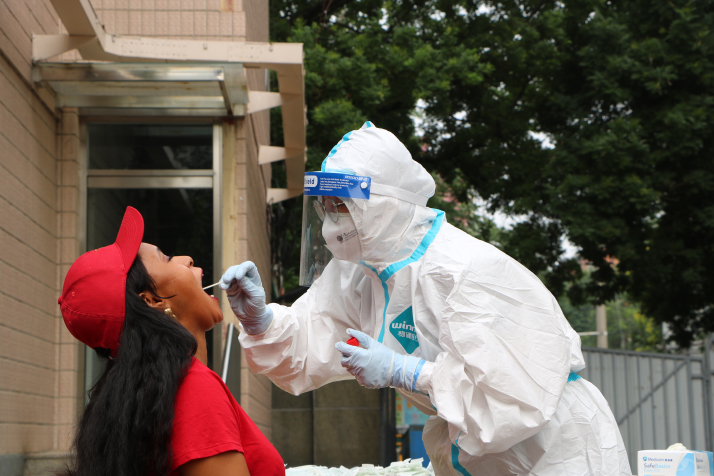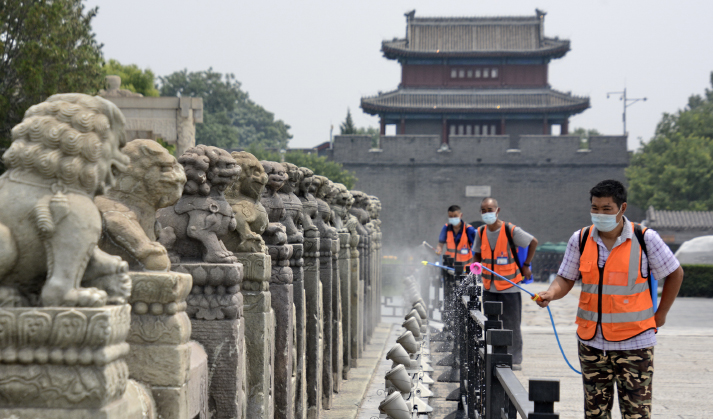|
||||||
|
||||||
| Home Nation World Business Opinion Lifestyle China Focus ChinAfrica Video Multimedia Columnists Documents Special Reports |
|
||||||
|
||||||
| Home Nation World Business Opinion Lifestyle China Focus ChinAfrica Video Multimedia Columnists Documents Special Reports |
| Nation |
| Beijing reports no new domestically transmitted COVID-19 cases but precautions remain |
| Beijing launches massive tests of COVID-19 cases in a fast and targeted manner |
| By Li Nan · 2020-07-10 · Source: NO.29 JULY 16, 2020 |

Bridget Mutambirwa, a Zimbabwean living in Beijing, takes a nucleic acid test in Beijing on July 3 Workers disinfect a public area in Fengtai District, Beijing, on July 4 (LI KAIZHI)
Four minutes and 52 seconds. That's the time it took Bridget Mutambirwa to take a nucleic acid test for the novel coronavirus disease (COVID-19) in Beijing on July 3. Just 24 hours later, the result was released on the Health Kit applet. It was negative. "The whole process was faster than I expected," the 37-year-old Zimbabwean told Beijing Review. Three days later, Beijing reported no new domestically transmitted cases, the first time after new cases kept surfacing in the capital since June 11. From June 11 to July 5, the city reported 335 locally transmitted cases, of whom 47 percent worked in the Xinfadi wholesale market in Fengtai District in southwest Beijing, according to the Beijing Municipality Government. It took Beijing 26 days to bring the number to zero. Fast and targeted "Beijing didn't become the second Wuhan or New York thanks to fast, well-targeted and draconian epidemic prevention and control measures," Wu Zunyou, chief epidemiologist with the Chinese Center for Disease Control and Prevention, said in an video interview with The Beijing News on July 3. After the first new case was reported on June 11, it took only 22 hours to locate the hot spot—the Xinfadi wholesale market, the largest of its kind in the capital. The market was locked down within 48 hours. "The timely lockdown of Xinfadi cut off the main transmission channel," Wu said. All close contacts of the new case and more than 8,000 business people working in the market underwent the nucleic acid test within a day of the closure and were put under medical observation. Epidemiologists found that many of the Xinfadi people with a positive test result had no symptoms in mid-June. "It means they were tested and detected at an early stage of the disease," Wu said. Among all the 335 new cases in Beijing, 98 percent had mild symptoms. Wu thinks two factors contributed to this. "Many patients are young and got timely medical care before showing any symptoms," he said.  Workers disinfect a public area in Fengtai District, Beijing, on July 4 (XINHUA)
Mass tests Mass nucleic acid tests are a good way to identify asymptomatic cases. Beijing built temporary sample collecting points in communities and inflatable laboratories and implemented 24-hour testing in shifts and batches, thereby increasing its daily testing capability by five times, from 100,000 samples in mid-June to 500,000 in early July. Beijing can test more samples per day if it uses five-in-one batch testing, that is, testing five samples in one go. If the result is positive, the samples will be tested again to identify the infected cases. It can be used for residents living in low-risk areas who have no close contact with confirmed cases and haven't been to medium- or high-risk areas. On June 23, Beijing's first inflatable laboratory, Huoyan, or Eagle Eye, was erected at the Daxing District Sport Center, 7.5 km south of Xinfadi. It runs 24 hours in three shifts, testing 30,000 samples per day. The lab uses seven mechanical arms to extract nucleic acid. A mechanical arm can extract 96 samples at once, much faster than human efforts. "The lab, built with a modular layout, has space for further customized upgrading," Liu Xin, head of the lab, told Beijing Evening News. In addition, over 400 nucleic acid test staff arrived from 12 provinces and municipalities in late June to aid tests in the capital. Wang Shichan, a staff with the Clinical Laboratory of Zhongnan Hospital of Wuhan University, volunteered for the mass tests in Beijing. "When Wuhan was hit by the virus, medical teams from all around the country came to help us. Now that the demand for nucleic acid testing is increasing in Beijing, we should immediately offer to help," she told Beijing-based Bingdian Weekly. In less than one month, more than 11 million Beijing residents underwent nucleic acid tests. Mutambirwa is one of them. A sample collecting point was set up near her company on July 3. "The test was not mandatory, as I am from a low-risk community. I took part because as a parent living in Beijing, whose work sometimes involves working in the field, I felt it necessary," she said. Over half of the 335 new cases in Beijing were identified through a mass nucleic acid test. "The tests have played in a key role in identifying the cases, blocking the transmission chain and containing the epidemic," Pang Xinghuo, Deputy Director of Beijing Center for Diseases Prevention and Control, said in a briefing on July 7. Beijing's swift and efficient response has comforted Mutambirwa. She is glad to see mass nucleic acid testing available in both large and small communities. "I feel they really don't want to leave any stone unturned," she said.  Staying alert As of July 9, Beijing had seen zero domestically transmitted cases for four days in a row. But still it's not the time to relax. "No report of confirmed case doesn't mean no risk," Pang said, adding that several thousand residents were still under medical observation and 31 asymptomatic cases had been detected in Beijing. Wu echoed Pang's views. "We can never let down guard at such a moment. One or two missed cases would result in new clusters or further transmission of the virus," he said. Wu believes the COVID-19 epidemic will not disappear suddenly like severe acute respiratory syndrome. He noted that the virus can transmit among communities at a rapid pace. The human body, especially the lung tissue, is an ideal hot bed for its growth. "It's very difficult to eradicate the virus in a short time," he said. Although the epidemic has been well contained in East Asia, he thinks resurgences may happen at any time. So China should stay alert. "The virus is…probably here to stay and we have no choice but to adjust to the 'new normal' way of living," Mutambirwa told Beijing Review, adding that everyone needs to keep wearing masks and sanitizing. "It's not yet time to relax until a vaccine is approved," she said. Wu is optimistic about vaccines being developed. "The results of phase I and phase II of clinical trials are encouraging and the vaccines are expected to be available by the end of the year," he said. (Print Edition Title: Safe But Still On Guard) Copyedited by Sudeshna Sarkar Comments to linan@bjreview.com |
| About Us | Contact Us | Advertise with Us | Subscribe |
| Copyright Beijing Review All rights reserved 京ICP备08005356号 京公网安备110102005860号 |